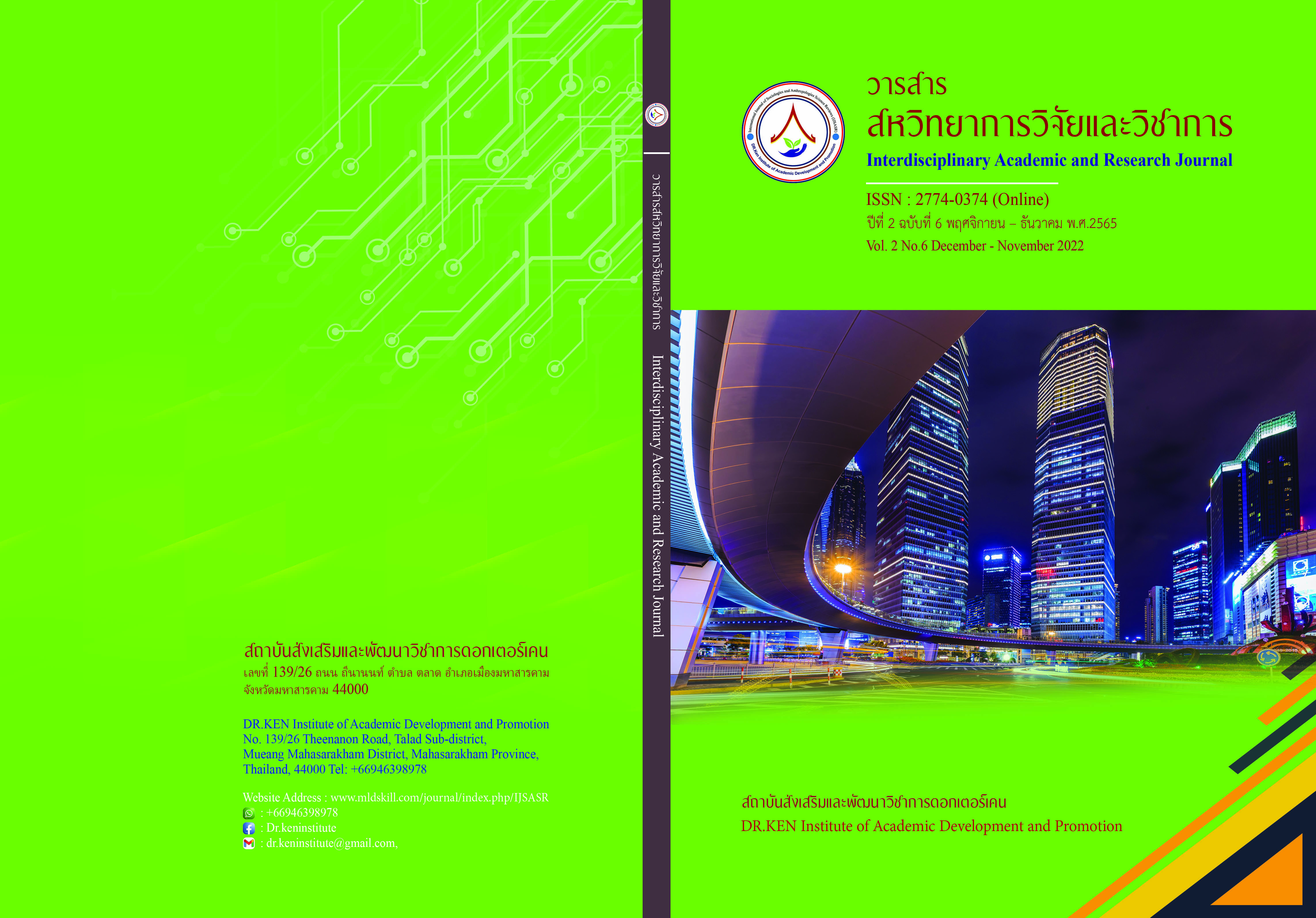Guidelines for Developing Executive Roles in Educational Resource Management in the Network Group to Promote the Efficiency of Special Education Centers Network Group 9
DOI:
https://doi.org/10.14456/iarj.2022.150Keywords:
Development Guidelines; , Executive Role; , Educational Resource ManagementAbstract
Roles of School Administrators in Educational Resource Management the executive has to lead the organization. to determine directions and policies for educational resource management of educational institutions There is a systematic and systematic management process. through the participation of personnel in educational institutions to make the most efficient and effective use of the acquired resources. The objectives of this research were (1) to study the current and desirable conditions of school administrators' roles in educational resource management and (2) to study guidelines for developing school administrators' roles in educational resource management. The research was divided into 2 phases. Phase 1 studied the current and desirable conditions of school administrators' roles in educational resource management. The sample is Administrators and teachers, 205 people. Tools used in the research. as a questionnaire The consistency index was 0.80 – 1.00, the reliability was 0.97, and the discrimination was between 0.26 – 0.73. The tool used was an interview form with 9 experts. Data were analyzed by descriptive analysis. The results of the research revealed that (1) the current and desirable conditions of the school administrator's role in educational resource management as a whole and each aspect were in the lowest and highest levels, respectively, and sorted from the most necessary needs of the school administrators' roles in educational resource management from the PNI values, namely, setting policies and plans Determining required resources from policies and plan supervision and evaluation of resource utilization Utilizing resources resource allocation (2) Guidelines for the development of school administrators' roles in educational resource management, namely, the educational resource management school administrators' role development program are as follows: Module 1 Utilization of resources Module 2 formulation of policies and plans and determining the required resources from policies and plans. Module 3 in resource acquisition and resource allocation and module 4 in supervision and evaluation of resource utilization. The results of the overall program evaluation were appropriate and possible at the highest level. And most respectively And from interviews with experts, it was found that school administrators must understand the context and roles and responsibilities of educational institutions. And used to plan policies and plans for educational institutions through the participation of all parties. With the PDCA process, there is a readiness survey and the need for resources is identified to match the project. There is a systematic and regular follow-up, supervision, and evaluation of personnel resource utilization. Resources are used adequately and in line with the action plan to develop educational institutions to achieve success as planned.
References
เทอดนรินทร์ อุปลี. (2556). การบริหารทรัพยากรทางการศึกษาของโรงเรียนสังกัดสำนักงานเขตพื้นที่การศึกษาประถมศึกษาจันทบุรี เขต 2. วิทยานิพนธ์ปริญญาครุศาสตรมหาบัณฑิต. บัณฑิตวิทยาลัย: มหาวิทยาลัยสุโขทัยธรรมาธิราช.
ถวิล มาตรเลี่ยม. (2544). การปฏิรูปการศึกษาโรงเรียนเป็นฐานการบริหารจัดการ. กรุงเทพฯ: เสมาธรรม.
ธัชชัย จิตรนันท์ (2555). การบริหารทรัพยากรทางการศึกษา. พิมพ์ครั้งที่ 2. มหาสารคาม : สำนักพิมพ์มหาวิทยาลัยมหาสารคาม.
ธีระ รุญเจริญ. (2553). ความเป็นมืออาชีพในการจัดและบริหารการศึกษายุคปฏิรูปการศึกษา (ฉบับปรับปรุง) เพื่อการปฏิรูปรอบสอง และการประเมินภายนอกรอบสาม. พิมพ์ครั้งที่ 6. กรุงเทพฯ : ข้าวฟ่าง.
นารีรัตน์ รักวิจิตรกุล. (2554). การระดมทุนสำหรับสถานศึกษา. มหาสารคาม : มหาวิทยาลัยมหาสารคาม.
ปรีชา คัมภีรปกรณ์ และคณะ. (2556). ประมวลสาระชุดวิชา การบริหารทรัพยากรการศึกษา (พิมพ์ครั้งที่ 8). นนทบุรี: มหาวิทยาลัยสุโขทัยธรรมาธิราช.
ยงยุทธ เกษสาคร. (2548). ภาวะผู้นำและการทำงานเป็นทีม. กรุงเทพฯ: วี.เจ.พริ้นติ้ง.
ศูนย์การศึกษาพิเศษ สำนักบริหารงานการศึกษาพิเศษ. (2561). แนวทางการพัฒนาคุณภาพเด็กพิการสำหรับผู้ปกครองที่มารับบริการภายในศูนย์การศึกษาพิเศษ. กรุงเทพฯ: ศูนย์การศึกษาพิเศษ สำนักบริหารงานการศึกษาพิเศษ.
สนอง เครือมาก. (2537). คู่มือสอบ: ปฏิบัติการของสำนักงานคณะกรรมการการประถมศึกษาแห่งชาติ. กรุงเทพฯ: อัมรินทร์การพิมพ์.
สำนักงานคณะกรรมการการศึกษาแห่งชาติ. (2548). ประสิทธิภาพการบริหารโรงเรียนประถมศึกษา.กรุงเทพฯ: สำนักงานคณะกรรมการการศึกษาแห่งชาติ.
สำนักงานคณะกรรมการการศึกษาขั้นพื้นฐาน. (2562). นโยบายสำนักงานคณะกรรมการการศึกษา ขั้นพื้นฐานปีงบประมาณ 2563. กรุงเทพฯ : โรงพิมพ์ชุมนุมสหกรณ์การเกษตรแห่งประเทศไทย.
สุทธิวรรณ ตันติรจนาวงค์. (2546). การระดมทรัพยากรเพื่อการจัดการศึกษาในสถานศึกษาในประมวลสาระชุดวิชาการจัดการสถานศึกษา หน่วยที่ 1. นนทบุรี : มหาวิทยาลัยสุโขทัยธรรมาธิราช.
สุมาลี ศรีพุทธรินทร์. (2555). เอกสารประกอบการสอนวิชาการบริหารทรัพยากรการบริหารสถานศึกษา (School Administrative Resources Management). นครพนม : มหาวิทยาลัยนครพนม.
สุรีวัลย์ ภูมิพันธ์, (2559). การพัฒนาแนวทางการระดมทุนของสถานศึกษา สังกัดสำนักงานเขตพื้นที่การศึกษาประถมศึกษาบึงกาฬ. (วิทยานิพนธ์ปริญญาครุศาสตรมหาบัณฑิต). มหาสารคาม : มหาวิทยาลัยมหาสารคาม.
สุวิมล ว่องวาณิช. (2558). การวิจัยประเมินความต้องการจำเป็น. กรุงเทพฯ : สำนักพิมพ์แห่งจุฬาลงกรณ์มหาวิทยาลัย.
Lindhal, W.E., (1992). Strategic Planning for Fund Raising: How to Bring in More Money Using Strategic Allocation. San Francisco: Jssey-Bass.
Downloads
Published
How to Cite
Issue
Section
License
Copyright (c) 2022 Jitta Junkhonkhan, Chumnian Pollaharn

This work is licensed under a Creative Commons Attribution-NonCommercial-NoDerivatives 4.0 International License.
Copyright on any article in the Interdisciplinary Academic and Research Journal is retained by the author(s) under the under the Creative Commons Attribution-NonCommercial-NoDerivatives 4.0 International License. Permission to use text, content, images, etc. of publication. Any user to read, download, copy, distribute, print, search, or link to the full texts of articles, crawl them for indexing, pass them as data to software, or use them for any other lawful purpose. But do not use it for commercial use or with the intent to benefit any business.
















.png)


